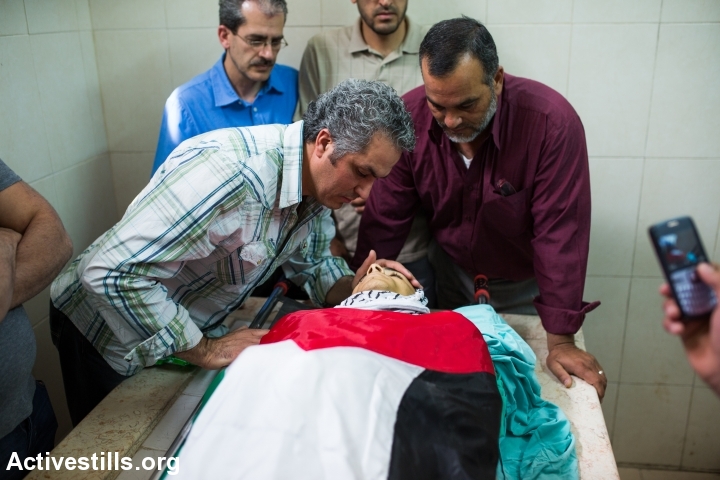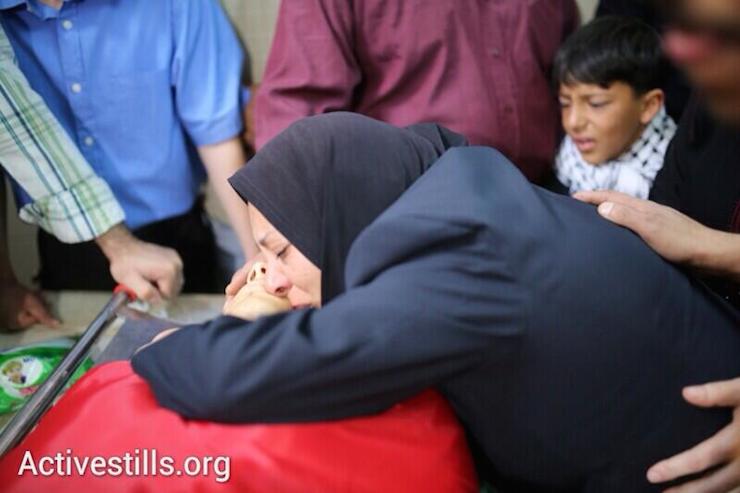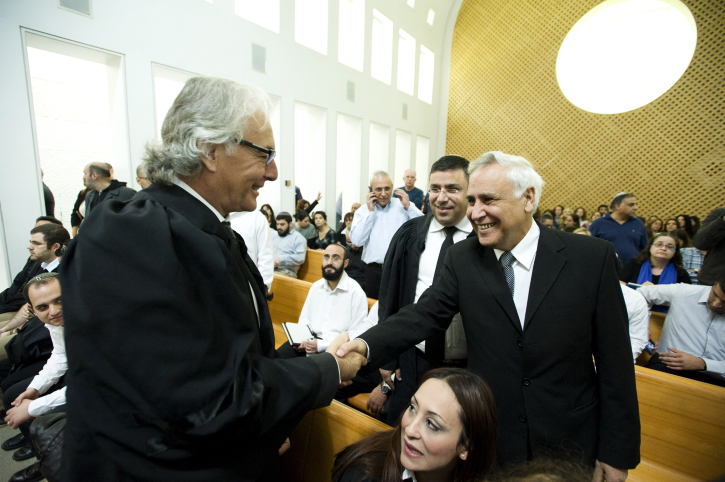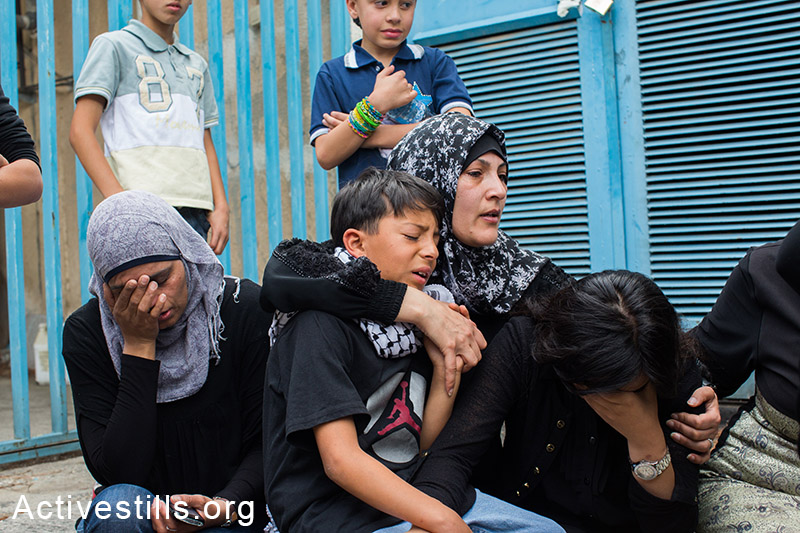The Nawara family expected to hear the sentence of the Israeli soldier who killed their son, Nadeem. Instead, they were forced to sit quietly while the soldier’s lawyer argued that it was not his client but Nadeem who was guilty of a crime.

The hearing began poorly. Siam Nawara was on the stand, testifying in what was supposed to be the sentencing of the Israeli soldier who killed his son. The midday sun sliced through the wooden slats on the Jerusalem courtroom windows and illuminated the drab, white room. Clanging carts and cars could be heard from Salah a-Din Street outside. Nawara spoke in Arabic. Next to him stood a court-appointed translator and interpreter. From the agitated grumbling in the courtroom, it was clear she was doing a terrible job.
A man named Hatem, who identified himself as a friend of the Nawara family, shook his head, exasperated. “She’s translating him all wrong,” he said to me. The judge, already seemingly frustrated, demanded that the audience, many of whom were now quite audibly voicing their objections to the translation, quiet down. “Your honor,” the translator, a young woman with short hair, told the judge, “I’m afraid I don’t know how to translate what he’s saying.” The first translator left the room and a second one, an older woman, took her place at the front of the courtroom.
The translator’s failure captured the anxieties of Palestinians present at the hearing: the justified fear of being misinterpreted and misrepresented; the feeling of being misunderstood and unwanted; the frustration of having either to express oneself in the language of the occupier, or to entrust an employee of the occupying government with conveying one’s words and intentions.
Nawara began to speak again. This time, he was repeatedly interrupted by the defense lawyer, Zion Amir, who objected to Nawara’s calling his client, Ben Deri, a “killer of Palestinian of children,” which for Nawara, he surely was. The translation problems and Amir’s objections burned through the time allotted for Nawara to speak. The judge asked him “to keep it short.”
“I just wanted to say something very important,” Nawara began, “that throughout the previous hearings they didn’t allow me to speak.” He continued, “The soldier didn’t follow orders, my son was killed, we hope for the harshest sentence.”
“Nadeem would hug and kiss us every time he would leave the house. And now his room is empty and he is gone. It is very hard for someone to lose their son.” After comparing the court’s gentle treatment of Ben Deri to the harsh sentences given to Palestinians found guilty of lesser crimes, Nawara closed his testimony. “As long as the trial has continued, it has negatively affected my family,” he said. “Our suffering is impossible to describe.”
Creating a ‘blood libel’
Nadeem Nawara, Siam’s son, and another Palestinian teenager, Mohammed Abu Daher, were killed during an unarmed Nakba Day protest on May 15, 2014, in the Palestinian town of Beitunia, near Ramallah. Nadeem was 16, and Mohammed, 17. Neither posed any threat to Israeli forces at the time they were shot.

In the hours after the deadly shootings, the Israeli defense establishment, hasbara activists, and politicians rushed to deny that the army had used live fire that day. Even after CCTV footage of the moments of the two boys’ deaths was published, Israeli officials created and stoked conspiracy theories that the entire scene was staged, that the two boys were not actually killed, and that the footage was fabricated or tampered with. Without having seen the footage, then-Defense Minister Moshe Ya’alon claimed that it had been edited. Former Israeli Ambassador to the U.S. Michael Oren went on CNN to tell Wolf Blitzer that there was too little blood in the video to indicate that the boys had died. Jonathan S. Tobin, editor of Commentary magazine online, wrote that “the film is a fraud” and likened it to a blood libel.
When CNN footage matching the CCTV video was released, it became impossible to deny that Israeli forces had fired the deadly shots from considerable distance. One of the bullets was recovered from Nawara’s backpack — it had pierced his chest and exited his back, coming to rest among his schoolbooks and papers. A police forensics investigation proved that Ben Deri, 21 at the time and serving in the Border Police, had fired the lethal shot. No autopsy was performed on Mohammed Abu Daher. Deri was never charged for killing the second boy.
In December of 2014, Deri was indicted for manslaughter in the shooting death of Nadeem Nawara. The case has been ongoing since then, prolonged by some 50 hearing delays, cancellations, the dismissal of the first judge due to personal connections with a witness, and the delayed appointment of the second judge.

In January of 2017, the prosecution reached a plea deal with Deri and Amir. Deri admitted to unintentionally using live ammunition, instead of rubber bullets, to disperse the protesters in Beitunia. The severity of the crime was downgraded to negligent manslaughter. At Tuesday’s hearing, the judge was expected to announce Deri’s sentence. He didn’t, however, due to Amir’s numerous objections and interruptions. The Nawara family will have to wait at least until April to hear the judge sentence the man who killed their son.
‘This whole thing is a joke’
The plea bargain is a significant concession for the Nawara family, and it is hard to disagree with them. The various videos from the protest, particularly Deri’s behavior during the incident and after (e.g. Deri’s public embrace of right-wing extremists), all point to something more sinister. Even the claim that Deri meant to disperse the crowd, rather than shoot to harm the Palestinian boys, seems like a stretch, as there were hardly any demonstrators at the time the two were killed. What appears in the CCTV footage is far from the “dangerous scene” of soldiers under a hail of rocks that Deri’s defense described. And there were several other live rounds fired that day, not just the one that killed Nadim, raising the question: how does one accidentally fire live ammunition instead of rubber-coated bullets more than once? “If the judge accepts this plea bargain,” Nadim’s father said in March, “it will prove these are only mock courts that aim to whitewash Israel, portraying it as a state that respects the rule of law.”
The plea bargain also greatly reduced the likelihood of a severe sentence against Deri. “This whole thing is a joke,” Firas Assali, the Nawara family’s lawyer, told +972. “Since the beginning, the prosecution didn’t do its job,” he continued. “There is no justification for a plea bargain.” Assali added that under the terms of the deal, Deri’s sentence could be as lenient as community service. “This is a green light to the army to continue to treat Palestinians as numbers and targets, and not as human beings.”
The Beitunia shootings have also become a prime example of how, even when faced with overwhelming evidence, many Israelis, and especially those who are professional defenders of the state and its policies, refuse to believe that Israeli forces can do any wrong.
As part of the sentencing proceedings, Ben Deri’s lawyer, Zion Amir called several character-witnesses to testify on Deri’s behalf and persuade the judge to grant him a lenient sentence. Amir, a well-known criminal defense lawyer, has made his career defending right-wing extremists and some of Israel’s most unsavory characters: former President Moshe Katzav, convicted of rape; the Jewish youths who burned the Dawabshe family to death in the West Bank village of Duma; and the Israelis who killed Haftom Zarhum, an Eritrean asylum seeker, in a lynching following a terrorist attack at the Be’er Sheva central bus station in October 2015. Amir has worked with the Honenu legal group, which represented the three Israelis who burned to death 16-year-old Mohammed Abu Khdeir in 2014.

Three of the five witnesses that Amir called to the stand had been Deri’s commanding officers; the fourth was an army human-resources officer whom knew Deri well, while the fifth was a high-ranking police munitions expert. None of them seemed to understand that by signing the plea bargain, Deri had admitted to killing Nadeem, nor that the charge of negligent manslaughter was two-fold: not only had he fired a live round instead of a rubber-coated bullet, but he had fired at someone who did not present an immediate danger.
The army officers spoke about the shooting as if it were theoretical. “I don’t believe this event occurred,” one of Ben’s commanding officers said. “Ben was the most moral soldier in the unit,” another claimed, adding, “I didn’t believe the things that were reported.” “If one of my children would grow up to be like Ben, I would praise God,” the third commanding officer said. “He did his job, he fired a rubber bullet. I put him on the front, and I would do it again,” the third officer concluded. The judge intervened to remind them that Ben Deri had, in fact, admitted to causing Nadeem’s death. For a moment, even Zion Amir looked embarrassed.
Then the high-ranking munitions expert took the stand. “There’s no such thing as a scene that’s free from danger,” responding to Amir’s prompts to describe the situation from the soldier’s point of view. “From our perspective, anyone at the scene [of a protest] presents a threat.” It is rare to hear the Israeli military’s view of Palestinian protesters so clearly and nonchalantly articulated.
Blaming the victim
As the hearing dragged to a close, the prosecution presented its recommendations quickly: a strong sentence, including jail time, not simply for the crime but to deter future negligence. The lead prosecutor, a tall woman with jet-black hair, pointed out that the defense witnesses and Deri himself had shown little remorse or willingness to take responsibility for the killing.
When it was time for the defense’s closing arguments, however, Amir put on a show. Draped in the billowy black robe that Israeli lawyers wear in court, and with white hair that descended to his collar, Amir assumed the role of a kind of cartoon villain. He had already demanded that the judge order veteran Haaretz journalist Amira Hass to sit in the back of the room because her typing disturbed him, and continued to throw threatening looks in Hass’s direction throughout the trial. Now, he demanded that the judge force Assali, who was translating for Nadeem’s father, to move seats or leave the courtroom. People talking behind his back made him feel threatened, Amir said.
His closing remarks were long-winded. He claimed to “express the cry of soldiers who defend their homeland.” He stressed, “We are in a war for our lives here, I’m not exaggerating.” He asked that the text of the court proceedings be edited so that Avner Gvaryahu, the executive director of Breaking the Silence, could not use them against Israel at the United Nations. He threatened to withdraw the plea bargain. He asked the judge for a light sentence and to rule out jail time, calling the prosecution’s recommendation “a call for punishment that cries out to the heavens in its injustice.” He demanded the judge accept new material that would strengthen the case against Deri having to serve any time — even community service.

Halfway through Amir’s remarks, he switched from defending his client to, perversely, casting blame on Nadeem. The teenager’s face was covered by a keffiyeh when he was killed — why, Amir asked, “perhaps because he wanted to a commit a crime?” “Something in the deceased’s behavior was meant to threaten,” Amir charged. He claimed Nadeem had thrown stones, adding that stone throwing is a crime punishable by a mandatory minimum. “No one should call a 17 year old who goes to a protest to throw stones a good boy,” Amir declaimed. It was as if Nadeem was being tried for getting killed.
I watched Siam Nawara shift in his seat as Amir defamed his dead son. From the hearing’s start, the judge and the defense had treated the Nawara family and their Palestinian supporters with casual disrespect. The translation of Siam’s testimony, his only chance to speak about the killing of his son in court, had been botched. During the rest of the hearing, the court had provided no translator for the family, forcing Assali to translate by whispering into Siam’s ear from the seat behind him. Amir was allowed to call Nadim a criminal, yet Siam could not intervene in the proceedings of court in a country where he is not a citizen but a subject, living under military rule.
The hearing ended after five hours of deliberation. I lingered in the courtroom with the Nawara family as the prosecutor explained in English and in Hebrew, through Assali’s translation, that the sentence had been delayed — again.
We walked out of the courthouse doors into the cold, dark air. On Salah a-Din, students carrying colorful backpacks, like the one Nadeem was carrying when he was killed, walked past the yellow lights of shops and food stands. Cars and mopeds puttered past us on the street. I asked Siam Nawara what he thought after the hearing. “It’s not justice,” he told me. “There’s no justice in Israel. It’s always postponed.”
Michael Schaeffer Omer-Man contributed to this report.
Correction: A previous version of this article gave an incorrect explanation for why an autopsy was never performed on Mohammed Abu Daher. The sentence in question has been removed.

